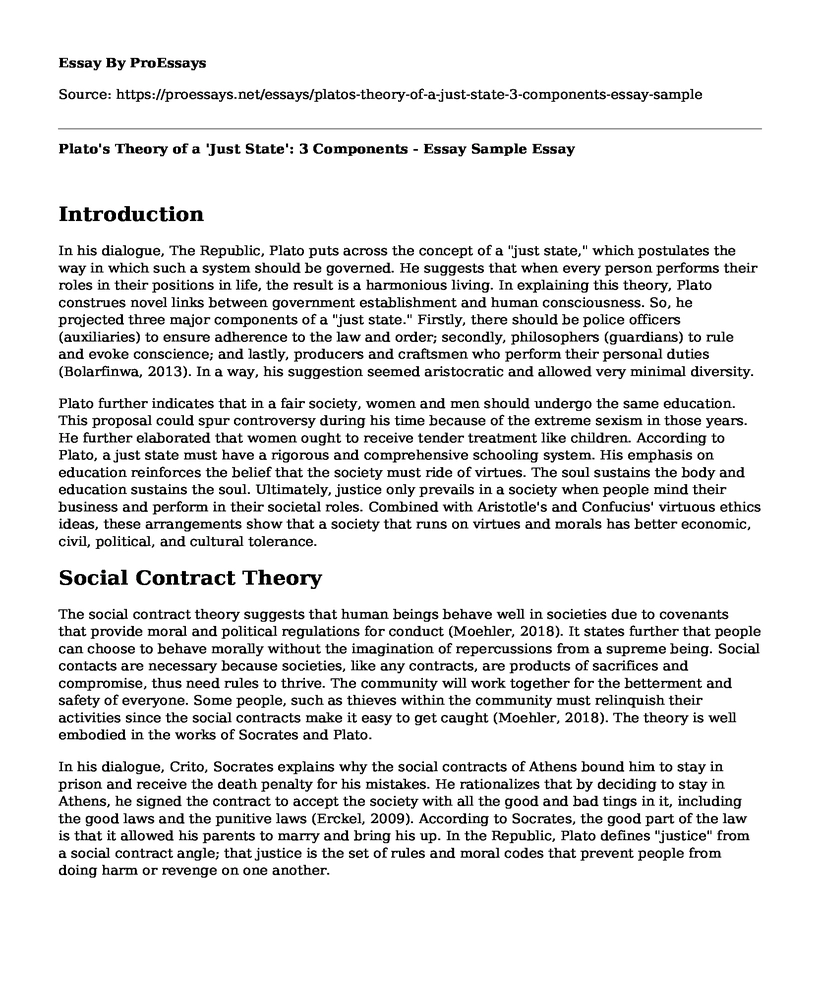Introduction
In his dialogue, The Republic, Plato puts across the concept of a "just state," which postulates the way in which such a system should be governed. He suggests that when every person performs their roles in their positions in life, the result is a harmonious living. In explaining this theory, Plato construes novel links between government establishment and human consciousness. So, he projected three major components of a "just state." Firstly, there should be police officers (auxiliaries) to ensure adherence to the law and order; secondly, philosophers (guardians) to rule and evoke conscience; and lastly, producers and craftsmen who perform their personal duties (Bolarfinwa, 2013). In a way, his suggestion seemed aristocratic and allowed very minimal diversity.
Plato further indicates that in a fair society, women and men should undergo the same education. This proposal could spur controversy during his time because of the extreme sexism in those years. He further elaborated that women ought to receive tender treatment like children. According to Plato, a just state must have a rigorous and comprehensive schooling system. His emphasis on education reinforces the belief that the society must ride of virtues. The soul sustains the body and education sustains the soul. Ultimately, justice only prevails in a society when people mind their business and perform in their societal roles. Combined with Aristotle's and Confucius' virtuous ethics ideas, these arrangements show that a society that runs on virtues and morals has better economic, civil, political, and cultural tolerance.
Social Contract Theory
The social contract theory suggests that human beings behave well in societies due to covenants that provide moral and political regulations for conduct (Moehler, 2018). It states further that people can choose to behave morally without the imagination of repercussions from a supreme being. Social contacts are necessary because societies, like any contracts, are products of sacrifices and compromise, thus need rules to thrive. The community will work together for the betterment and safety of everyone. Some people, such as thieves within the community must relinquish their activities since the social contracts make it easy to get caught (Moehler, 2018). The theory is well embodied in the works of Socrates and Plato.
In his dialogue, Crito, Socrates explains why the social contracts of Athens bound him to stay in prison and receive the death penalty for his mistakes. He rationalizes that by deciding to stay in Athens, he signed the contract to accept the society with all the good and bad tings in it, including the good laws and the punitive laws (Erckel, 2009). According to Socrates, the good part of the law is that it allowed his parents to marry and bring his up. In the Republic, Plato defines "justice" from a social contract angle; that justice is the set of rules and moral codes that prevent people from doing harm or revenge on one another.
Classical Versus Social Contract Approaches to Justice
Compared to contemporary justice systems, the social contract model has proven durable because it uses principles that everyone would accept for themselves. Classical justice is marred with selfish biases among judges, lawyers, and prosecutors, and sometimes ends up completely averting justice. The social contract hypothesis focuses on behavior and virtues, thus can enhance a community's general self-esteem, harmonize their interests, and make their lives more meaningful (Erckel, 2009). Since people cooperate to protect their name, peace, and honor, the theory works in most set-ups. One challenge with the theory is that implementation may be problematic, when a considerable number in the community is of rogue individuals, which will necessitate the application of contemporary laws.
References
Bolarfinwa, O. (2013). Evaluation of plato's ideal state. Place of publication not identified: Grin Verlag.
Erckel, S. (2009). Classical Social Contract Theory: The Classical Social Contract Theories of Hobbes, Locke and Rousseau Compared. Munchen: GRIN Verlag GmbH.
Moehler, M. (2018). Minimal morality: A multilevel social contract theory.
Cite this page
Plato's Theory of a 'Just State': 3 Components - Essay Sample. (2023, Apr 10). Retrieved from https://proessays.net/essays/platos-theory-of-a-just-state-3-components-essay-sample
If you are the original author of this essay and no longer wish to have it published on the ProEssays website, please click below to request its removal:
- Responses to Qestions on Euthanasia
- Descartes Arguments Concerning the Body and Soul Essay
- Counselling Paper Example
- Ethical Considerations of Human Cloning Essay Example
- Essay Example on Frustration: Seneca's Lessons to Guide Us Through Tough Times
- Essay Sample on Ethical Relativism: A Subjective View of Moral Principles
- Essay Sample on Codes of Ethics: Accuracy, Consent, Diversity & Professionalism







